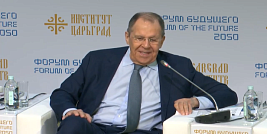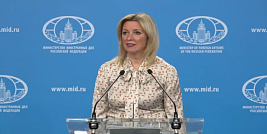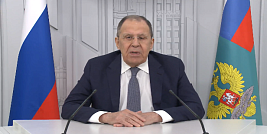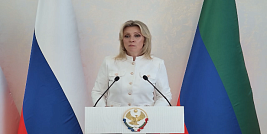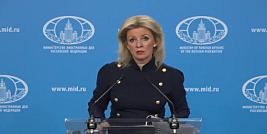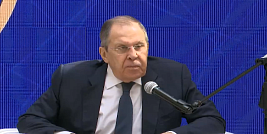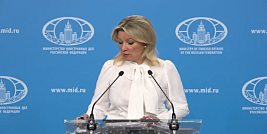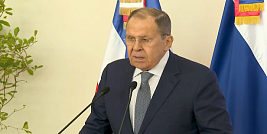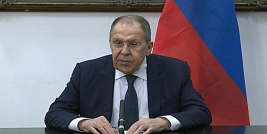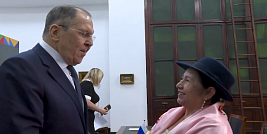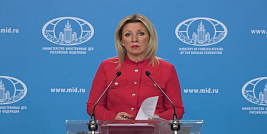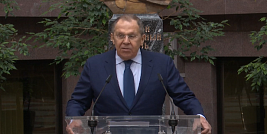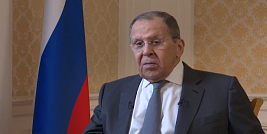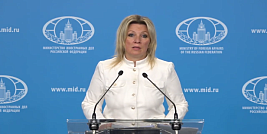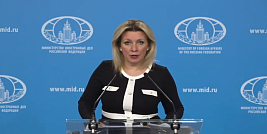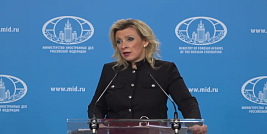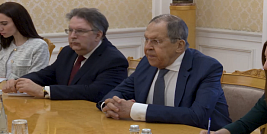Briefing by Foreign Ministry Spokeswoman Maria Zakharova, Moscow, September 11, 2024
- Foreign Minister Sergey Lavrov’s participation in a roundtable discussion on the Ukraine crisis at the Foreign Ministry’s Diplomatic Academy
- Sergey Lavrov’s upcoming meeting with ICRC President Mirjana Spoljaric
- The 79th UN General Assembly opens in New York
- The September 11 terrorist attacks
- Ukraine crisis update
- 81st anniversary of liberation of Donetsk and Mariupol from Nazi invaders
- Moldova update
- Recent anti-Russia statements by MI6 chief Richard Moore and CIA Director William J. Burns
- President of Finland’s anti-Russia statements
- School with partial instruction in Russian in Eastern Finland
- Norway’s increasing militarisation of the Spitsbergen Archipelago
- Report by the Foreign Ministry regarding the glorification of Nazism, the rise of neo-Nazism, and other practices contributing to the growth of modern racism, racial discrimination, xenophobia, and related intolerance
- The latest set of unilateral anti-Russian export control sanctions imposed by the Republic of Korea
- Russia assisting to the socioeconomic development of Kyrgyzstan
- 10th St Petersburg International United Cultures Forum
- The 80th anniversary of the Soviet troops’ Baltic strategic offensive
- Statements by the Speaker of the Armenian parliament
- Russia’s relationship with Arab countries
- The murder of Turkish-American activist in West Bank
- UK’s sanction pressure on Russia
- Germany’s settlement plan for the Ukraine conflict
- The President of Türkiye’s statement on Crimea
- US plans to deploy mid-range missiles in Japan
- The “success’ of US defence companies
- Russia-China overarching partnership and strategic cooperation
- Armenian Prime Minister’s statements
- Slovakian Prime Minister’s statements on wearing Nazi symbols being unacceptable
- Statements by the former US Secretary of State on political issues
- Azerbaijan’s application to join BRICS
- Statements by the Foreign Ministry of Iran
- The trilateral agreements between the leaders of Russia, Azerbaijan and Armenia
- Azerbaijan’s military cooperation with the United States and NATO countries
- Liberalisation of the visa regime between Armenia and the EU
- Russia-Kyrgyzstan relations
- Chinese Foreign Minister Wang Yi’s visit to Russia
- Indian National Security Adviser Ajit Doval’s visit to Russia
- Statements by Iranian officials
- Northern Sea Route development
- Dedollarisation
- BRICS and its role in the multipolar world
- Celebrating the 80th anniversary of the Victory in the Great Patriotic War
- Changes to Russia’s nuclear doctrine
Foreign Minister Sergey Lavrov’s participation in a roundtable discussion on the Ukraine crisis at the Foreign Ministry’s Diplomatic Academy
A regular roundtable discussion will be held at the Foreign Ministry’s Diplomatic Academy on September 12. Its theme will be The Ukraine Crisis: Terrorist Methods Used by the Kiev Regime. As always, Foreign Minister Sergey Lavrov will deliver extensive remarks at the discussion, which will be attended by the heads of about 80 diplomatic missions.
The traditional format of the event allows diplomats to hold an open and frank exchange of views on the Ukraine crisis. During previous discussions, they held in-depth discussions on the geopolitical aspects of the crisis, its legal and human rights dimensions, the militarisation of the Nazi regime in Kiev, illegal sanctions, as well as the neutral actors’ mediation and humanitarian initiatives.
Sergey Lavrov’s upcoming meeting with ICRC President Mirjana Spoljaric
President of the International Committee of the Red Cross Mirjana Spoljaric will come to Russia to attend the 4th Eurasian Women’s Forum, which will be held in St Petersburg on September 18−20.
Before the forum, she will visit Moscow, where she is expected to meet with Foreign Minister Sergey Lavrov on September 17. They will discuss a broad range of issues related to humanitarian relief across the world.
The ICRC President’s agenda includes meetings with officials from other government and public agencies, as well as the leadership of the Russian Red Cross.
The 79th UN General Assembly opens in New York
The 79th UN General Assembly opened on September 10. On September 28, Foreign Minister Lavrov, who leads the Russian delegation, is scheduled to deliver remarks during the high-level General Debate, to be held on September 24−30.
Sergey Lavrov will also attend a number of sideline events, including those to be held by BRICS, the G20 and the Group of Friends in Defence of the UN Charter. As usual, he also intends to hold many bilateral meetings, including with UN Secretary-General Antonio Guterres.
This UN General Assembly will be held amid growing global tensions. This trend is the direct result of the collective West’s destructive policy of maintaining its plummeting domination on the global stage. Washington and its client states are resorting to the most unscrupulous methods, including those the former parent countries used, such as adopting illegal unilateral sanctions, restricting access to modern technologies, pumping out resources, and regular military interventions, to which they often resort.
However, it is obvious that these Atlanticists’ attempts are doomed to failure. The development of a more just and democratic multipolar world order is an objective and historically contingent process. It is based on the shift of the centre of gravity in international affairs towards the Global South and East. We see the development of new centres of political, economic, social and cultural influence in Asia, Africa and Latin America, which can and want to increase their contribution to overcoming global crises and rightfully demand more respect for their interests.
The full use of the UN’s potential is hindered by the West’s egoistical attempts to subordinate that platform and use its bodies for settling scores with those who the collective West regards as guilty only because they want to uphold their national interests, as well as to replace the UN Charter with an objectionable concept of the world order based on pseudo-rules.
In this context, the Russian delegation will continue efforts to restore the high status of the UN as the central coordinating mechanism for balancing the interests and actions of the member states towards achieving the UN goals.
We regard the UN as one of the main platforms for encouraging the long overdue discussion on adjusting the architecture of international relations to the new multipolar realties.
Just as our partners in the Global Majority, we are committed to upholding the primacy of the goals and principles of the UN Charter in their entirety and interconnectivity. We will carry on our coordinated efforts against the West’s neo-colonial practices.
Russia’s position on the items on the agenda of the 79th Session of the UN General Assembly have been put forth in detail in the relevant document published on the Ministry’s website.
The September 11 terrorist attacks
Exactly 23 years ago, on September 11, 2001, a terrible tragedy shocked the world. A large-scale terrorist attack, organised by Al-Qaeda, destroyed the Twin Towers of the World Trade Centre in New York City, killed many innocent people and stunned the United States and the entire world.
The Russian Federation was the first to condemn this inhuman act and to offer assistance and cooperation to the United States. Just a few hours after the international community learned about the tragedy, Russian President Vladimir Putin called for pooling the efforts of the international community in the fight against terrorism. Less than three weeks later, members of the UN Security Council passed Resolution 1373 that established the Counter-Terrorism Committee as the UN Security Council’s specialised auxiliary body. This document provided a powerful impetus and laid the foundation of multilateral cooperation for combating terrorism all over the world.
However, the situation eventually started developing in accordance with a different scenario. The US-led collective West was unable to discard Cold War-era phobias and prejudices. It gradually refused, step by step, to perceive Russia as an equal partner in combating terrorism, especially after the beginning of the special military operation. Instead of dealing with a common cause, specifically, countering terrorism, it politicised this issue in every way and advanced its own narrow mercenary approaches. Russia’s collaboration with European countries and the United States in the sphere of counterterrorism operations was virtually frozen.
We do not see any real striving, on the part of the collective West, to consolidate the efforts of the international community for fighting terrorism. The reverse is true. This is proved by facts, including the bombing of the Nord Stream gas pipelines and a refusal to collaborate with the Russian side to analyse the circumstances of this terrorist attack.
Moreover, the West moved to infringe upon Russia’s rights and interests at specialised international organisations and formats and to directly oust our country from them. This includes the suspension of our involvement in Financial Action Task Force (FATF) activities for politically motivated reasons, the unjustified restriction of our prerogatives during consultations of countries parties to the 2005 Council of Europe Convention on the Prevention of Terrorism and the 2015 Additional Protocol to it, as well as a Conference of Countries Parties to the 2005 Council of Europe Convention on Laundering, Search, Seizure and Confiscation of the Proceeds from Crime and on the Financing of Terrorism.
The practice of the past 20-plus years shows that Western interference in the domestic affairs of sovereign states, including Iraq, Libya, Syria and Afghanistan, has largely provoked an upsurge in international terrorism. Today, the United States and its allies support the criminal Kiev regime that actively uses terrorist methods against peaceful Russian civilians and the country’s civilian infrastructure facilities with the help of Western funding. Following the beginning of the special military operation, the US-led West completely discarded all proprieties (it is pintless to talk about shame), and uses foreign mercenaries, including militants from international terrorist organisations, for supporting Ukraine.
In turn, we cannot help but heed the current situation. Nevertheless, we continue to say that there is no alternative to collective counterterrorism efforts, with the UN’s central and coordinating role.
We reaffirm our commitment to interstate collaboration in the fight against terrorism with all the concerned parties, in accordance with the existing international legal framework. It is necessary to recognise the leading role of states and their law enforcement agencies in combating terrorism. It is unacceptable to use this issue, as well as the terrorist groups, as a geopolitical tool for interfering in domestic affairs and destabilising regimes seen as “undesirable” by the West. It is also necessary to renounce double standards, to prevent the destruction of any specific standards and to discard hidden agendas. We will continue to conduct joint work, primarily within the framework of the UN, the SCO and the specialised counterterrorism mechanism, as well as BRICS, the CIS and the CSTO.
To confirm these words, I would like to mention numerous facts regarding the Kiev regime’s monstrous terrorist activities, which are directly sponsored by the United States and the United Kingdom.
The Kiev regime continues its terror campaign against civilians in Russian regions.
On September 3, 2024, a Russian serviceman reported witnessing yet another crime committed by Ukrainian neo-Nazis in the Kursk Region, where they ruthlessly murdered a father and his small child, who attempted to leave one of the towns seized by the Bandera followers in a car.
On September 4, 2024, Russian media gained access to the testimony of a Russian woman who was injured in a Ukrainian drone attack on a civilian vehicle, which a family of six, one of them a two-year-old child, used to leave the village of Cherkasskoye Porechnoye in the Kursk Region. The woman was seriously wounded when two bombs were dropped on the car.
On September 4, 2024, Ukrainian online resources posted a video of Ukrainian military personnel torturing Russian prisoners of war in the Kursk Region. The Russian Investigative Committee has opened criminal proceedings.
On September 7, 2024, Ukrainian neo-Nazis targeted a hospital in Gorlovka, Donetsk People’s Republic, injuring five people, including an underage girl.
On September 9, 2024, Apti Alaudinov, deputy head of the Main Directorate for Military-Political Work of the Russian Defence Ministry, told the media that the Akhmat special operations forces found a Ukrainian prisoner’s action camera on which he recorded his mates beating up civilians in the Kursk Region.
On the night of September 10, 2024, the Ukrainian army launched a massive drone attack on central Russian regions. All the 144 drones have been shot down, 20 of them in the Moscow Region. Regrettably, several people have been injured, and a woman died in Ramenskoye near Moscow.
I cannot say that these crimes are on the conscience of the Kiev regime because they don’t have a conscience, just like their Western patrons. They are responsible for these crimes. What we should talk about in this case is not conscience but terrorism. The Russian law enforcement agencies register every crime, and those who commit them will be punished to the fullest extent of the law.
We call on the relevant international organisations to face up to these and other crimes committed by the Kiev regime, including terrorist attacks, and to respond to them appropriately.
We continue our efforts to call the military criminals controlled by the Kiev gang to account.
Alexander Lyubas, a terrorist in the employ of the Main Directorate of Intelligence of the Ukrainian Defence Ministry, has been sentenced to 20 years in prison for attempting to land on the Crimean coast and for attacking Russian servicemen.
Sergey Rudik, a mining expert of a sniper detachment of the extremist and terrorist Azov special operations unit, has been given an 18-year prison sentence for involvement in a robbery committed by an organised criminal group and for maltreating civilians.
The Prosecutor’s Office of the Donetsk People’s Republic has approved the indictment of Latvian citizen Alvis Luksa and citizens of Georgia and Finland Kartlos Rusitashvili, Vano Nadiradze and Riku Arima for taking part in the hostilities on Ukraine’s side. They have been put on the international wanted list.
On September 3, 2024, the Russian Investigative Committee charged Ukrainian colonels Pavel Fedosenko, Fyodor Yaroshevich, Andrey Matviishin and Dmitry Khrapach in absentia with mass murders.
On September 4, 2024, the Second Western District Military Court gave a life sentence to Dmitry Khrapach, commander of the 27th Artillery Brigade of the Ukrainian Armed Forces, for organising the terrorist shelling of the Belgorod Region.
On September 4, 2024, the Supreme Court of the Donetsk People’s Republic sentenced Nikolay Velichko, commander of a Ukrainian sniper unit, to 25 years in prison for murdering a civilian in Mariupol.
I would like to repeat what the Russian authorities and law enforcement bodies have said before: none of the Ukrainian criminals and their accomplices will escape punishment.
And now, I would like to say a few words about those who are protecting, financing and encouraging them to commit more crimes. I mean the West. On September 6, 2024, the Ukraine Defence Contact Group held its 24th meeting at Ramstein Air Base, Germany. It was personally attended by Vladimir Zelensky, who again begged for more air defence systems and asked his patrons for allowing their long-range missiles to be used to strike targets inside Russia. As he wrote on his social account, this is necessary to give Moscow an impetus for peace talks.
I would like to ask whether he is ashamed of talking like this. However, what shame can we talk about when mentioning the name of Vladimir Zelensky? One should, rather, talk about amnesia. In the spring of 2022, under pressure from the then UK Prime Minister Boris Johnson, Bankovaya Street ended the talks that they actually asked Moscow to initiate. It appears that Vladimir Zelensky has forgotten about this. He personally signed the relevant executive order on banning talks with Russia. Have they started thinking about peace now?
Nevertheless, the rather predictable Western response discouraged Vladimir Zelensky. That same day, addressing the 50th edition of Cernobbio Forum (TEHA Forum), organised by Ambrosetti, a local think-tank, in Italy, the ringleader of the Kiev junta expressed disappointment over the fears of his partners and the fact that Ukraine was unable to hit the Kremlin.
However, the West did not fail to provide its puppets with new batches of military aid. Sweden announced its $440 million aid package. The United States voiced its intention to spend $250 million on the needs of the Armed Forces of Ukraine. Germany, Denmark and the Netherlands did not lag behind their allies either. As gifts, Kiev will receive missiles for HIMARS multiple launch missile systems, artillery pieces, ammunition, patrol speedboats and armoured vehicles.
All this confirms the Western line to continue and escalate the conflict. They no longer care what happens to Ukraine and the Ukrainians. At the same time, they still do not realise that this is fraught with uncontrollable escalation.
We have noted instigatory statements by the Prime Minister of the Netherlands Dick Shoof. On September 2, 2024, he visited Ukraine and approved Ukrainian strikes on Russian power plants and oil reservoirs. According to his logic, these facilities are not civilian because no people live there. But do people live in aircraft? What does the prime minister of the Netherlands think of this? Do they live aboard ships and trains? Perhaps, the people of the Netherlands live in the metro; they go down below and use metro stations as residential quarters. What is this all about? According to the Prime Minister of the Netherlands Dick Shoof, it is possible to hit oil reservoirs and power plants because no people live there. I would like to remind the prime minister that people do not live in outpatient clinics and schools. I have never heard about people living in shops and other social facilities. They work shifts there, come there to buy food and to obtain medical treatment, they bring children, but they do not live there. What kind of Dutch logic is this? At the same time, high-precision strikes of the Russian Aerospace against purely military targets, including a centre for training military communications specialists in Poltava cause are met with indignation by the supporters of the Kiev regime. They display fits of rage and lapse into showroom hysterics. Previously, we would have called this “double standards.” However, there are no standards any more, and this amounts to unbridled Western cynicism.
We are recording new violations of the Russian border by Western journalists visiting the Kursk Region during tours, organised by pro-Bandera supporters. For example, on September 1 and 4, 2024, Swiss media resources Neue Zurcher Zeitung an Sonntag and Aargauer Zeitung published biased news reports by Kurt Pelda and Tobias Matsch extolling pseudo-humanism of AFU militants who invaded the territory of the Kursk Region. Journalists from the Australian Broadcasting Corporation (ABC) Kathryn Diss and Fletcher Yeung followed suit, hushing up Ukrainian neo-Nazis’ atrocities and looting sprees.
However, there is a snag. The above-mentioned Kurt Pelda could not refrain from openly complaining about Kiev’s censors who forbade him to post five photo and video materials showing a civilian car that was destroyed in Sudzha, a burnt-out house and a postal service bus without wheels.
Russian law enforcement agencies are investigating how these correspondents made it into the Russian Federation and are making relevant decisions in line with Russian legislation.
On September 6 of this year, the National History Museum of Ukraine in the Second World War opened an exhibition entitled Outside Our Forever Home dedicated to the “defensive operation by the Armed Forces of Ukraine” in the Kursk Region. The pieces on display include a nose from the monument to Lenin, which the Ukrainian barbarians pulled down in Sudzha, military insignia and chevrons torn off from the uniforms of Russian POW’s or dead Russian soldiers, staged photographs taken at gun point and meant to dehumanise the identity of civilians living in border areas of Russia, etc. At the same time, the organisers sought to “substantiate” Kiev’s historical claims to the Kursk Region. According to their allegations, this region of the Russian Federation is from time immemorial the “north-western part of Slobozhanshchina, a major historical and geographical region of Ukraine.” To reinforce their point, they referred to certain “artefacts” of the “Ivan Mazepa epoch,” or the times of the “Cossack colonisation” and the “liberation war” of the early 20th century. Madhouse news.
If this exhibition is any testimony to something, it is that the true intent behind the Kursk joyride by the Armed Forces of Ukraine is to wipe out the forcibly drafted Ukrainians, an intent kept a closely guarded secret. There is no other explanation. All of this is monstrous, anecdotic and tragicomic to an extent that it is impossible to imagine that anyone will believe in the Kiev regime’s long-term interests in this Russian territory, whatever they are. This is necessary for a short-lived, bloody PR extravaganza to please Vladimir Zelensky and those who pay for this sort of tricks. Besides, it is yet another evidence of mass-scale crimes committed by Bandera followers in Russia.
The scale of desertion from the Ukrainian army is mind-boggling. Against this background, the Ukrainians are still forcibly driven, like cattle to the slaughterhouse, to beef up the dwindling ranks of the AFU. Internet is riddled with reports and videos of the manhunt conducted by officers of territorial recruitment centres (TRC), who often manhandle their prey. These man-hunters behave like German-appointed police goons from among WWII Ukrainian collaborationists. But their outrages are a source of mounting hatred in the Ukrainian population. In recent time, there are more frequent cases of their vehicles being burned or them attacked with cold steel or firearms. It’s all like in the Hollywood Joker horror. A clown with a blood-red smile brought to power by accident, if for a lot of money. He is mocking people and leads them to a collective grave. Vladimir Zelensky matches the description. The screenplay has been written in Hollywood, United States of America.
As a rule, the further fate of the forcibly drafted men is tragic. Ukrainian Nazis taken prisoner by Russian forces testify that the AFU command sends soldiers to participate in “meat assaults,” with refuseniks executed on the spot. The Zelensky junta that preys on the Ukrainian nation (with the Americans and Britons standing behind them) is annihilating the Ukrainian people in a purpose-oriented manner.
The situation being what it is, the Kiev regime is giving much thought to creating a comeback ministry. The collective West would gladly authorise this initiative to get returns on its exorbitant investment in the massacre meant to drag on until the last Ukrainian dies on the battlefield. The important thing is to create the appearance. Perhaps they will catch someone in the West among the “volunteers” supposedly wishing to go back home. The other day, former UK PM Boris Johnson went on record as saying that there had been no mass-scale mobilisation in Ukraine because men under 25 years of age were not drafted. Obviously, Mr Johnson is eager for this to start. However, Ukrainian media report that initiatives to reduce the conscription age are already in the works. Quite clearly, the Ukrainians could not do without “external recommendations” with regard to this matter.
The abovementioned facts once again confirm the relevance of the special military operation, whose aim is to de-Nazify and demilitarise Ukraine and remove the threats coming from its territory. As the Russian leaders repeatedly stated, all its goals will be achieved.
81st anniversary of liberation of Donetsk and Mariupol from Nazi invaders
On September 8 of this year, Donbass marked the 81st anniversary of the liberation of Stalino – the capital of that mining region now known as Donetsk – from the Nazi invaders. Back then in 1943, the Soviet troops of the Southern and Southwestern Fronts pressed forward with an offensive exploiting the success achieved in the Battle of Kursk. The Red Army defeated 13 enemy divisions during the operation, creating a bridgehead in Donbass for liberating the entire territory of the Ukrainian SSR.
On September 10, 1943, during the Donbass operation, the Red Army liberated Mariupol. Building on the progress achieved during the Battle of Kursk, the Soviet troops continued confidently freeing their native lands, pushing the enemy further west. As soon as on September 22, 1943, the enemy was thrown back beyond the Dnieper. As many as 66,000 Soviet soldiers and officers lost their lives, and more than 200,000 were wounded in those battles.
History has a tendency to repeat itself. In 1941−1943, the flags of Nazi Germany and Ukrainian collaborators were hanging on buildings in the occupied cities of Donetsk and Mariupol. Today, we are battling with their ideological heirs, and German equipment is burning and will continue to burn on the battlefields, as it did back then.
We congratulate the people of Donbass on this important milestone and wish all of us a speedy and final victory over Nazism.
The Moldovan authorities are pushing the country towards a disaster similar to the one the West has just “tested” in Ukraine. As the presidential elections scheduled for October 20 and the referendum on Moldova’s EU accession are drawing nearer, official Chisinau’s anti-Russia rhetoric is growing increasingly twisted and grotesque.
On September 3, Foreign Minister Mihai Popșoi said that Russia was “testing Moldova’s strength” by exerting a “malicious influence” on it. On September 5, Maia Sandu said on television that the Kremlin allegedly spends $2 million every month to tarnish her image. In fact, such money would probably be needed to try to improve her image at least a little, although I doubt that even this amount would be enough. But you would need no money to tarnish her image because it can’t be tarnished any further after what she has done to it, bringing [approval of her policies] to a historic low.
Moldova continues to fight dissent in society. In addition to repressions against the opposition and independent media, the country is using a degrading education system. The Moldovan Ministry of Education and Research has threatened to reconsider the funding for those educational institutions where political opposition took part in events marking the beginning of the school year. An official inquiry was announced against one of the teachers at a Chisinau lyceum who refused to praise the “bright European future.”
Pro-government propagandists continue to harass clergymen of the Orthodox Church of Moldova accused of “having links with Russia.” They call on “involving the competent authorities” to investigate Orthodox priests who take pilgrimage trips to our country. The phrasing is clearly absurd because the Orthodox Church of Moldova is a self-governing unit of the Russian Orthodox Church, and liaising with the Moscow Patriarchate is something it would be expected to do by definition.
The Maia Sandu regime divides Moldovan citizens into “loyal” and “disloyal” not only depending on their religious affiliation, but also on their place of residence. In late August, Moldovan banks announced the termination of the only payment system people could use for money transfers between Russia and Moldova. Who was the first to be hit by this move? Moldovans working in Russia who lost the opportunity to help their families and friends back home. The Maia Sandu regime has targeted Moldovan nationals who have taken the opportunity to work in Russia, to make money and send earnings home to their families.
The collapse of the economy and education in Moldova has led to a massive outflow of the working-age population, primarily young people. According to experts, by 2030, the number of Moldovans born abroad will exceed the number of those born at home. Meanwhile, the government continues to pretend that depopulation is not real. According to the spokesperson for Moldova’s government, Moldovans rarely leave the country; allegedly, most of them simply “travel.”
It is not surprising that the Moldovan leaders’ anti-ratings are at an all-time high. According to the most recent polls, 57 percent of respondents have a negative attitude towards Maia Sandu; 60 percent disapprove of the prime minister, and 63 percent, of the parliament speaker. As many as 75 percent of Moldovans believe that members of the ruling party are corrupt, and 69 percent believe that the justice system is government-controlled.
Chisinau is trying to remedy the situation not by recovering the economy or improving the citizens’ well-being, but by organising an endless string of field visits by high-ranking EU emissaries who praise the Moldovan officials, shake their hands, and pat their shoulders hailing the achievements in strengthening the republic’s “stability” only they (not the people of Moldova) can see. Perhaps this is stability – with no sign of economic growth, no development of science or education. This whole story with the West, which we see repeat year after year in different parts of the world, just does’t work.
We call on the Moldovan authorities to abandon their Russophobic policy and listen to their citizens, before renaming them as Romanians. Only this probably is just a matter of time. The Maia Sandu regime hopes to go on exploiting its hatred of all things Moldovan, given that it is obviously backed by a political force that advocates the Romanianisation of Moldova. The citizens of Moldova have entrusted their lives to a government that promised to take care of them. But today, the officials in Chisinau only care about two things: the West, because it sponsors them, and about themselves.
Recent anti-Russia statements by MI6 chief Richard Moore and CIA Director William J. Burns
We have taken note of the remarks made by MI6 chief Richard Moore and CIA Director William J. Burns on September 7 at the FTWeekend Festival, organised by the Financial Times. Once again, baseless accusations and false claims were directed at our country. These statements reaffirm the commitment of London and Washington to a destructive approach toward Russia, as well as their intent to pursue a path of escalation and further heighten international tensions.
Both officials claimed that the recent incursion of Ukrainian forces into the Kursk Region has “raised questions … across the Russian elite about where is this all headed” and suggested that it would be wrong to “confuse a tight grip on power with a stable grip [in Russia].” They further remarked that the Ukrainian armed forces’ actions in the Kursk Region had “brought the war home to ordinary Russians”. It’s unclear what information William J. Burns, Richard Moore, MI6, and the CIA are relying on – perhaps they are being fed more fabrications by the Kiev regime.
But perhaps, during the next weekend festival featuring the heads of US and British intelligence, someone should secretly inform them that after the so-called Kiev regime’s invasion of Russian territory (clearly orchestrated by Western countries), any remaining illusions that Russian elites and ordinary Russians may have had about Washington and London’s intentions toward our country have been shattered. What many may have missed in the statements from the US and Britain about their desire to inflict a strategic defeat on Russia became all too real for our people through the strikes on the Kursk Region. So, let there be no illusions that anyone in Russia has grown more sympathetic to Western countries, as MI6 and the CIA might like to believe. This illusion was dispelled, just as they struck Ramenskoye.
We are fully aware that the Kiev regime is merely a tool, with Washington and London pulling the strings. Is there really a narrative within the CIA or MI6 suggesting that our citizens do not recognise who is truly orchestrating this “bloody music?” Does anyone in US intelligence genuinely believe people don’t see that the West is behind these efforts, pushing the Kiev regime and its proxies to carry out terrorist acts against Russian citizens? Everyone here knows exactly what’s going on.
William J. Burns took the liberty of making disrespectful remarks about President Vladimir Putin, once again resorting to insults. He even referenced the 2018 attempted assassination of Sergey Skripal in Salisbury, despite the lack of any moral or factual basis. Meanwhile, the head of British intelligence claimed that Russian spies are becoming increasingly reckless in the UK, Europe, and elsewhere, adding that the Russian intelligence services “having gone a bit feral”. Since they continue to reference the Skripal case, we have a simple request: perhaps they could finally reveal their whereabouts? We trust that British intelligence hasn’t “gone feral” or lost touch with reality and still knows where Sergei Skripal and Yulia Skripal are.
We are well aware of the ongoing efforts of the British and American authorities and intelligence services to destabilise the domestic political situation in Russia. If anyone in Great Britain, the US or other Western countries still hopes to use our non-systemic opposition, which obviously does not work as an opposition but as agents of influence, to encourage it to violent protests or to greater madness, including in connection with various elections, then it will not work. Such calculations are doomed to failure from the very beginning. Russian society, perfectly understanding the goals of such malicious activity of Washington, London and their satellites, is only becoming more united and resistant to the machinations of our enemies. No one today has any doubts that the US, Britain and the entire NATO community are behind all the terrorist attacks that are carried out on the territory of our country.
At the same time, we are fully aware that the UK and the US will continue to use every available tool of confrontation against Russia, having been designated by the collective West as their primary enemy and adversary for the foreseeable future. The flow of weapons to the criminal Kiev regime will only intensify, pushing it to fight to the last Ukrainian. It’s clear that the Anglo-Saxons aim to isolate and weaken our country as much as possible, ideally reshaping it according to their own model and on their terms. But this will not succeed.
We have repeatedly warned British and American officials, including the heads of their diplomatic missions in Moscow, that any attempts to interfere in Russia’s internal affairs, whether through subversive actions, spreading disinformation, or meddling in our elections and the special military operation, will be met with firm and decisive measures, including declaring those involved as persona non grata and expelling them.
These recent statements further confirm that the Anglo-Saxon powers have joined forces against our country, using the Kiev regime to pursue their geopolitical objectives. They are the architects of aggressive global policies and the concept of delivering a strategic defeat to Russia on the battlefield – a goal that will undoubtedly fail.
President of Finland’s anti-Russia statements
We have noted another portion of anti-Russia statements made by President of Finland Alexander Stubb. In the An Hour with the President radio programme, he talked about Russia as the number one threat to Finland, the Kiev regime’s right to use weapons supplied by its Western allies to strike at Russian territory, and his admiration for Finnish mercenaries’ courage fighting as part of neo-Nazi Ukrainian formations.
Mr Stubb admires the courage of Finnish mercenaries fighting against Russia. We will remember this and remind him of his words. Just wait.
Anti-Russia statements like this, which have recently become normal for the Finnish authorities, have made us think about how false were the calls made by Helsinki, including Mr Stubb’s who was Finnish Foreign Minister at one time, for good neighbourliness and the construction of a united Europe without dividing lines based on the interests of all the states of the continent. If he says now that this had all been before 2022, and after 2022, it changed, then let him read the statements made by former German Chancellor Angela Merkel and former President of France Francois Hollande where they said that they were never going to implement the Minsk Agreements on a peaceful settlement around Ukraine.
We also regard this aggressive rhetoric as an indicator of what we have repeatedly said before. Having decided to join NATO, Finland became one of the small, non-decisive member states of the alliance. The only thing left for them is to support of the entire Russophobic policy that is being formed without their participation. Now they have to sing along, which is exactly what they are doing.
School with partial instruction in Russian in Eastern Finland
We have noted the Finnish media’s attempts to attack on a private school in Eastern Finland that still provides instruction in Russian, with its branches operating in Imatra, Joensuu, and Lappeenranta. In the past, these cities actively developed ties with the border regions of Russia. Finnish tabloids, citing “certain sources in the sphere of foreign and security policy,” accused the educational institution of creating possible threats to national security. Once again, there are calls to close down this school.
It is noteworthy that this is a Finnish school providing instruction according to Finnish curricula. However, this did not stop those searching for yet another reason to pursue an anti-Russia policy.
These accusations could be regarded as ridiculous and insignificant: what threat to national security can schoolchildren pose? However, we are sorry to note that forces are raising their heads in Finland, for which the words “Russian” and “Russia,” are equal to “hostile” and “aggressive.” They try to find an enemy even in Finnish children studying Russian. This level of Russophobia is so clearly paranoid that even the Finnish Security Intelligence Service (Supo) thought it necessary to respond to this anti-Russia media campaign, stating that it does not consider this school a threat to national security and calling on the media not to engage in “excessive interpretations.”
I would like to elaborate on this. The Finnish police cannot say this but I can. There is someone behind these “excessive interpretations,” too. Perhaps the Finnish police will be interested.
Norway’s increasing militarisation of the Spitsbergen Archipelago
The Norwegian authorities continue to carry out their destructive policy of involving Spitsbergen in military planning and securing it in the zone of responsibility of the aggressive NATO bloc.
The latest steps include the Norwegian Navy frigate Otto Sverdrup’s visit to the archipelago in August in order to “assert Norwegian sovereignty” and exercise tasks in difficult climatic conditions. Meanwhile, the Longyearbyen airport workload by military aviation is growing. Norwegian Coast Guard ships, part of the Norwegian Navy, constantly patrol the waters of the archipelago and call at its ports. Representatives of the Norwegian Armed Forces leadership regularly visit Spitsbergen. The infrastructure capabilities of the Svalsat satellite tracking station are expanding. Let me remind you that it is, in fact, a dual-use facility. The inclusion of the archipelago in the system of military measures is also carried out by extending the relevant national legislation to it. Oslo is promoting a provocative suggestion that Spitsbergen may be subject to the 1949 Washington Treaty.
Actions like this, including those carried out under the pretext of the changing geopolitical situation, run counter to Norway’s obligations under the 1920 Spitsbergen Treaty, which states that the archipelago cannot be used for warlike purposes, as well as Oslo’s statements about its focus on maintaining low tensions in the Arctic region. They are detrimental to efforts to ensure peace and stability in the Arctic.
We can reaffirm Russia’s position that Norway militarising Spitsbergen is unacceptable. We call on the Norwegian authorities to strictly comply with the 1920 Treaty and refrain from stepping military activities on the archipelago in the future.
Report by the Foreign Ministry regarding the glorification of Nazism, the rise of neo-Nazism, and other practices contributing to the growth of modern racism, racial discrimination, xenophobia, and related intolerance
The Ministry’s website has released its latest annual report on the glorification of Nazism, the spread of neo-Nazism, and other practices that exacerbate modern forms of racism, racial discrimination, xenophobia, and related intolerance. This year’s release is timed to coincide with September 3, Victory Day over militaristic Japan and the end of World War II.
The report is traditionally based on the thematic resolution Combatting the Glorification of Nazism, Neo-Nazism, and Other Practices that Contribute to Fuelling Contemporary Forms of Racism, Racial Discrimination, Xenophobia, and Related Intolerance, which Russia, along with a broad coalition of co-authors from around the world, submits annually to the UN General Assembly. It is noteworthy that the vast majority of the international community supports Russia’s approach. In 2023, for instance, the Russian resolution was endorsed by 118 countries, while only 49 delegations, including the United States and Ukraine, opposed it. These opposing countries are predominantly from Western spheres of influence, such as EU member states and NATO-centric nations.
It is disheartening to observe that history is repeating itself. I must address this issue for the second time during the briefing. The methods pioneered in Nazi Germany and militaristic Japan are now being adopted at the state level in several countries. These governments not only glorify Nazism but also actively implement its principles. This is evident from their efforts to reshape public consciousness, erase historical memory, and promote neo-Nazi ideology among younger generations. There is a trend toward distorting the history of World War II, minimising the heroic achievements of the Soviet people, and downplaying the USSR’s role in defeating Nazism. It is particularly distressing to see how the governments of countries that were part of the anti-Hitler coalition are erasing the legacy of their own citizens, both soldiers and civilians, who sacrificed their lives in the fight against Nazism.
Since the beginning of the special military operation aimed at denazifying and demilitarising Ukraine and protecting the civilian population of Donbass, the collective West has openly supported the Nazi ideology represented by the Kiev regime – a regime they have purposefully and consistently nurtured. We have repeatedly highlighted this issue. The governments of these countries continue to channel significant resources, often at the expense of their own economies and the wellbeing of their citizens, into arming the Ukrainian armed forces. These forces include neo-Nazi groups that use Western-supplied weapons to carry out terrorist attacks on civilians and civilian infrastructure.
The situation in the Baltic countries, Poland, and the Czech Republic has become utterly absurd, as Western influencers are driving the creation of a new version of history. Historical facts are being distorted, Soviet monuments are being targeted, communism and Nazism are being cynically equated, Russophobia is being encouraged, and there is even open whitewashing and glorification of Nazis and their collaborators.
The US, Great Britain, and Canada are also complicit, with their governments often turning a blind eye to racism and xenophobia. This is justified under the guise of freedom of speech. This approach is not surprising, given that their efforts primarily focus on obscuring the troubling realities and severe consequences of their colonial past, which was founded on the doctrine of racial superiority.
The facts outlined in the report by the Foreign Ministry reinforce our country’s position that such overt acts of racial discrimination and the glorification of Nazism directly undermine the enduring principles established by the Nuremberg Tribunal. These actions pose a serious threat to the core values of genuine democracy, human rights, and international security as a whole.
Just as it did 85 years ago, Russia will not tolerate the spread of the “brown plague.” Alongside its allies, Russia is committed to ensuring that the sacrifices of the millions who fought for global freedom and prosperity are not forgotten or betrayed.
The latest set of unilateral anti-Russian export control sanctions imposed by the Republic of Korea
On September 9 of this year, the Republic of Korea’s latest package of unilateral anti-Russian export control sanctions officially took effect. Consequently, the total number of goods and technologies prohibited from being exported to Russia from South Korea has reached a record 1,402 items.
This move by Seoul is an unfriendly action, which did not catch us off guard: the decision to impose these restrictions was made in late June. It appears that the South Korean authorities are reacting to the historic results of President Vladimir Putin’s state visit to the DPRK.
We reiterate our stance on the illegitimacy of these and previous unilateral sanctions imposed by the Republic of Korea. These measures further restrict trade and economic cooperation with Russia, hinder the maintenance of bilateral relations in areas where cooperation is still feasible, and will undoubtedly make it more challenging for South Korean companies to re-enter the Russian market in the future. We urge Seoul to move away from following the illegitimate actions of other states, which contradict both legal standards and South Korea’s fundamental interests, and to instead act independently based on its own national priorities and international law.
Russia assisting to the socioeconomic development of Kyrgyzstan
Russia provides regular financial assistance to the socioeconomic development of the Republic of Kyrgyzstan. Over $390 million has been allocated for budget support since 2012, and 3,454 projects worth $707 million have been financed through the Russian-Kyrgyz Development Fund since 2015.
In 2022, the implementation process of the bilateral intergovernmental agreements to develop a tax administration system and create a product labeling system was completed, which made it possible to significantly increase tax collection and financing of social items in the budget of Kyrgyzstan.
Russia also provides assistance to the Kyrgyz Ministry of Emergencies and Ministry of the Interior. Rosatom State Corporation is working to reclaim the territories of the republic affected by uranium mining operations. Over 2.4 billion rubles have been allocated for these purposes in 2024-2030.
Work has begun to create nine comprehensive schools with instruction in Russian for 1,224 students each in Kyrgyzstan as part of implementing the intergovernmental agreement dated March 29, 2023.
About 7,000 citizens of Kyrgyzstan study at Russian higher education institutions at the expense of the federal budget.
Funds are allocated annually for the activities of the Kyrgyz-Russian Slavic University, named after the first President of the Russian Federation Boris Yeltsin. In particular, the university was provided with 444.5 million rubles of funding last year.
On September 2, 2024, the Russian Federation transferred 50 school buses to the Kyrgyz Republic. They are equipped according to all up-to-date safety standards. This was a continuation of Russia’s efforts to promote the development of Kyrgyzstan. Each bus is designed to carry 20 passengers and will deliver children to schools in remote regions of the republic.
The new buses were presented by the Eurasia autonomous non-profit organisation free of charge as part of the Eurasian Lyceum project aimed to form a network of schools that receive systemic infrastructure, financial and project support in the EAEU and other Eurasian countries. The exchange of modern educational methods, school renovation, teacher internships, as well as a scholarship programme are envisaged.
10th St Petersburg International United Cultures Forum
On September 11–14, St Petersburg hosts the 10th St Petersburg International United Cultures Forum. This is the largest Russian cultural event of the last decade with international participation. The main theme of the forum is “Culture of the 21st century: Sovereignty or globalism?” The participants will try to find an answer to this question.
The St Petersburg International United Cultures Forum is a reputable platform where the most acute issues can be discussed. Artists, cultural figures, officials responsible for the sphere of culture, businesspeople and journalists from across the world discuss issues of the global cultural agenda on an equal, mutually respectful basis.
The forum’s business programme includes seven sections on the following tracks: Theatre, Cinema, Museums, Circus, Business Culture, Media Culture, and Musical Culture. In addition, there will be three sessions covering more general, conceptual issues related to development of not just the cultural sphere, but also society as a whole: The Right to Heritage in a Multipolar World, Artificial Intelligence in Culture and National Sovereignty, and Cultural Heritage: Traditions and Modernity.
The forum has been held since 2015 under the patronage of President of Russia Vladimir Putin. A lecture by Patriarch Kirill of Moscow and All Russia, a meeting of the BRICS Ministers of Culture, and a meeting of the CIS Ministers of Culture will be the key events there.
Over 250 events are planned in total, including a united cultures concert featuring CIS performers, BRICS Culture Festival, a concert of CIS groups in the Peterhof State Museum Reserve, and the premiere of the ballet Crime and Punishment directed by Boris Eifman.
The 80th anniversary of the Soviet troops’ Baltic strategic offensive
The Baltic strategic offensive of the Soviet troops took place on September 14 – November 24, 1944. Its goal was to defeat the German group in the Baltic area and complete the liberation of Estonia, Latvia, and Lithuania.
Troops of the Leningrad, Baltic, and Belorussian Fronts, as well as units of the Baltic Fleet and long-range aviation, were involved in the offensive. USSR Marshal Alexander Vasilevsky was tasked with coordinating their actions. In total, the operation involved 900,000 Red Army soldiers, about 17,500 guns, 3,000 tanks, and 2,600 combat aircraft. The 16th Lithuanian Rifle Division, the 8th Estonian, and the 130th Latvian Rifle Corps took part in the liberation of their land.
The struggle for the Baltics was extremely fierce. The enemy, with a well-developed road network and infrastructure, actively manoeuvred and offered stubborn resistance.
On September 14, 1944, the troops of the Baltic Fronts began an offensive in the Riga direction after artillery and air preparation. During the first three days of the offensive, Soviet units advanced 20 km southeast of the Latvian capital. On September 22, Tallinn was liberated. On September 27, a landing operation began on the West Estonian Islands. It concluded with enemy forces being suppressed and control established over the entrance to the Gulf of Riga.
As a result of Red Army troops advancing to Memel (Klaipeda) and the Nazis’ rapid retreat, Riga was liberated by October 15.
On November 24, the Germans were driven out of the southern edge of Oesel Island (Sõrve Peninsula). Army Group North was inflicted a crushing defeat and pushed back to the Courland Peninsula.
The Soviet troops’ successfully coordinated actions resulted in the invaders being driven out from almost the entire territory of the Baltics, with 26 out of 59 enemy divisions crushed and three completely destroyed. The rest of the Wehrmacht forces were squeezed out to the sea in Courland. The frontline in the Baltic sector was reduced to 250 km. This made it possible to free up significant forces of the Red Army and use them in an offensive operation during the winter period of the victorious 1945.
Question: What is the Foreign Ministry’s position regarding the statements by the Armenian Parliament Speaker Alen Simonyan to the effect that Yerevan should think of Russian border guards’ presence on the Iranian and Turkish borders?
Maria Zakharova: I have seen these news and remarks. It may happen that Alen Simonyan was inattentive following the latest news conference by Prime Minister of Armenia Nikol Pashinyan.
I would also like to remind that the basic document regulating the activity of our border guards in the republic is the bilateral treaty On the Status and Conditions of the Activity of the Border Guard Troops of the Russian Federation in the Territory of the Republic of Armenia of September 30, 1992. Perpetual at that. For 30 years already Russian border guards have been protecting the frontiers of the Republic of Armenia together with their Armenian brothers-in-arms and confirmed on many occasions the expediency of their presence in Armenia, in particular by preventing illegal crossings of the Armenian border and stopping drug trafficking attempts.
Our border guard services have established a really large-scale and productive interaction, which obviously makes some Yerevan politicians nervous. We think that, if someone were to speculate on the expediency of the Russian border guard’s presence on the Armenian borders, then one has to think of how the frontier denuding may affect the country’s security in the absence of a complete normalisation in the region. This is the first thing.
Second, it seems to me that when people who are not professionals in the given subject talk about it so freely, then the floor should be given to those who put their lives on the line, who really protects the Armenian border not sitting in soft armchairs, but doing it with arms in their hands on the frontline for many years. Maybe we should ask them? Maybe they'll have their say? That will be the most valuable thing.
Question: Is it possible to speak about a full-fledged strategic partnership with Arab countries when major US military bases are stationed in their territories? Won’t this factor affect relations between Russia and Arab countries?
Maria Zakharova: I would divide these two components. I understand well enough the point of your question, but let’s start with the beginning.
Our relations with the Arab world as well as with the countries in other regions are traditionally based on the principles of equality, mutual respect and account of each other’s interests. Unlike countries of the collective West, we have never imposed our ideological paradigms on anyone, never said with whom they should be friends or foes. This is our position of principle. I have put it in simple words, but the conceptual and doctrinal documents spell out the relevant terminology.
We believe that thanks to this approach, we have been able to establish truly friendly ties with the peoples of the Middle East and North Africa. Their history goes back not decades, but has centuries-long roots, when no one there even heard about the United States.
Relying of this solid basis, we continue to develop a multifaceted interaction with our Arab partners. The intensity of the delegations’ exchange at all levels and increasing year-on-year trade with the countries of the region speak for themselves. This is the first thing. The second thing is that the presence of US military bases does not allow many countries and regions fully develop their relations with the partners they want to.
In addition, we can see that when even a sovereign state, including in the region you have mentioned, raises the question of US bases withdrawal from its territory, it cannot achieve it. We can see it from the example of various countries. The United States entered these territories in different ways: somewhere it was direct occupation of the entire country, somewhere it was seizure of the most important regions for the Americans to exploit natural resources.
They came and acted there in different ways. But they are reluctant to get out. It is difficult for the countries of the region to make US troops, mercenaries or US private military companies leave their sovereign territory. It is a challenge.
As it is, for one reason or another, voluntarily or forcibly, countries find themselves occupied by American troops, and they certainly must realise what this can lead to.
I will give you an example. Germany is a country with a well-developed system of legal practices, a democratic history, etc. There are numerous US military bases in the country, which were placed there so that “Germany felt safe.” And Germany is also the country that has lost major infrastructure, the most important component of its energy security – the Nord Stream 1 and Nord Stream 2 pipelines. This is how it works.
It also recently turned out that the Americans had been regularly wiretapping the German chancellors. This is the answer to the question of what those US military bases are really doing there. This holds true not only for this region, but for all regions of the world that have “American boots on the ground.”
Question: What do you think about the murder of Turkish-American activist Aysenur Ezgi Eygi during an anti-Israeli rally in Nablus, in the West Bank?
Maria Zakharova: This tragic incident once again confirms the correctness of what we have been saying regularly and with increasing intensity from the start – that the Gaza Strip is struggling with an unprecedented crisis and de-escalation is needed as soon as possible before it can be finally resolved. This truth must be embraced, and steps must be taken on this track. Continued bloodshed in Gaza inevitably leads to further escalation of violence in other occupied Palestinian territories, and everywhere across the Middle East.
A ceasefire must therefore be achieved as soon as possible and urgent humanitarian assistance must be provided to the people of Gaza who are suffering from the consequences of the fighting and the blockade. This is the only way to avoid new victims, to reduce regional tensions and create enabling conditions for launching a comprehensive process of political settlement relying on the universally recognised international legal basis.
Question: Yesterday, the media reported that London could lift sanctions against Moscow if they were found to be ineffective. Later, the British Embassy denied that statement. Can you comment on this situation?
Maria Zakharova: You must have imagined something that was not in the press release. If you read London’s paper carefully, you will certainly find British arrogance and their tendency to lecture others. What you will not find is any changes in their sanctions policy against our country. On the other hand, there is something in there that is actually true. This sanctions pressure is totally ineffective. This is a true statement that we can certainly agree with. The sanctions against Russia are ineffective as well as counterproductive for those who have designed them.
We are waiting for the British Embassy in Moscow to issue another press release stating that their sanctions policy against Russia has ended in complete failure for London.
They are being asked uncomfortable questions about this, so they make things up to worm their way out of it, but clearly unsuccessfully.
Question: La Repubblica has written, citing a source with connections to the German government, that Chancellor Olaf Scholz is allegedly preparing a peace plan that may include territorial concessions from Ukraine. Is Moscow ready to consider German peace initiatives? What could the European politicians’ changed rhetoric indicate?
Maria Zakharova: First, this is only rumour and speculation, without any formal confirmation. So, there’s nothing to comment.
Second, even when it is reported that someone is working on a peace initiative, we invariably express gratitude for looking for a solution, for trying to promote a settlement, or at least for discussing the matter in this way. None of this can be said about that news. Nobody will give a standing ovation to such attempts reported by the German media. That same Olaf Scholz is sending money and weapons to the Kiev regime. What peace could he be talking about when he is trying to cheat the international community again, just as his predecessor did when she said that Germany had no intention of honouring the Minsk agreements?
I believe the only hard fact proving the shift in Berlin’s position towards the idea of a peaceful settlement would be the termination of arms supplies to the Kiev regime, complemented with the condemnation of its terrorist attacks and an end to financing those vermin and their Nazi ideology, which Kiev is implementing with German money. Only then will we listen to or read without laughing that Berlin is considering peace moves.
I would like to draw your attention to a series of Foreign Minister Sergey Lavrov’s interviews and articles about possible negotiations and contacts and their formats. I would like to say again that when it comes to peace talks (regardless of any leaks and speculations), the German authorities have not indicted their intention in any way, either directly or through intermediaries. We know nothing about this.
As for the substance of peace talks, I would like to refer you to Sergey Lavrov’s detailed statements on this subject. Once again, Russia has stated more than once that it is ready for talks and did not refuse to talk when the Kiev regime asked for negotiations in 2022. No Russian official ever said that talks are not a priority.
I would like to remind you that one of our main goals is to protect the basic rights of people in Donbass and Novorossiya, to preserve their history, language, culture, traditions and religions, that is, the true values the illegitimate and bloody Kiev regime, which is past its expiry date, has been trying to ruthlessly suppress through legal bans, military force and derision.
The West, which claimed to be the guarddian of these fundamental values, has nothing to say about the developments in Ukraine and Russian regions that obviously run counter to its statements.
We believe that a serious peace plan for Ukraine, including territorial realities, must be based on that fundamental goal and complemented with security guarantees for Russia. Moreover, the constituent entities of Russia are not negotiable.
Question: President of Türkiye Recep Tayyip Erdogan has said that Crimea should be returned to Ukraine in accordance with international law.
Maria Zakharova: Let’s get it straight. I have finished answering your question by saying in no uncertain terms that Russian regions are the territory of the Russian Federation. Please, read our Constitution. There will be no talks on this issue. Russian regions are not negotiable.
Question: Will his statements of this sort affect relations between Moscow and Ankara?
Maria Zakharova: We hear similar and identical statements from various representatives of Türkiye, from top echelons of power to the expert community.
During all these years, we have explained our position to the Turkish side via the diplomatic channels and publicly. They know it. You are also regularly informed.
Question: According to The Japan Times, the US will deploy its Typhon middle-range missile systems in Japan. The newspaper says that previously this type of weapons was banned under the 1987 Soviet-US Treaty on the Elimination of Intermediate-Range and Shorter-Range Missiles. After its collapse, the US started to deploy these systems in different countries of Europe and the Asia Pacific Region. What is the aim of the constant US attempts to deploy mid-range missiles outside of its territory? How will this affect the situation in the region?
Maria Zakharova: We regularly discuss the issue of ground-based middle- and shorter-range missiles with our Chinese colleagues. We coordinate our approaches to this agenda. So, we can with good reason confirm that Moscow and Beijing’s assessments in this area are practically identical. This is corroborated by joint Russian-Chinese top-level statements.
The aim of the US deployments is obvious. Washington deploys forward-based missile weapons of different types as part of its comprehensive efforts to project strength on Russia and China within the framework of its statements regarding the “dual containment” strategy aimed at the two countries. It is also clear that simultaneously the Americans are bringing pressure to bear on some other states they dislike.
The consequences of the US actions are no less clear, either. They tend to undermine global and regional stability, lead to a general rise in tensions, and encourage an arms race.
As is clear, Russia and China will have to respond to the emergence of new and substantial missile threats by far from political means alone. No one should doubt that Russia – like, we are sure, China – will not allow their national security and defence capability to be compromised due to these destructive US actions.
In this context, let me remind you about the Russian-Chinese understanding made public by Foreign Minister Sergey Lavrov: Moscow and Beijing will respond to the US “dual containment” with “dual counteraction.”
Question: According to US media statistics, the total volume of US military support for Ukraine has exceeded $56 billion since the escalation of the Ukraine crisis in February 2022. The latest document, published by the US Department of Defence, on September 6, 2024, shows that during this process, 35 federal states have obtained contracts worth over $41.7 billion. Additionally, US military giants, including Raytheon and General Dynamics, have signed multi-billion dollar contracts with the US Department of Defence for manufacturing weapons. What do you think about the “successes” of the US defence industry’s enterprises?
Maria Zakharova: I would like to mention remarks by two Anglo-Saxon personalities. The first one belongs to British trade union activist Thomas Dunning who discussed the applications of capital and noted that: “A certain 10 percent will ensure its employment anywhere; 20 percent certainly will produce eagerness; 50 percent, positive audacity; 100 percent will make it ready to trample on all human laws; 300 percent, and there is not a crime at which it will scruple, nor a risk it will not run, even to the chance of its owner being hanged.” This statement is attributed to Karl Marx who merely quoted it. I believe that the British trade unionist knew his environment very well.
In 1961, President of the United States Dwight Eisenhower made a second statement (that sounds more like a warning): “In the councils of government, we must guard against the acquisition of unwarranted influence, whether sought or unsought, by the military-industrial complex. The potential for the disastrous rise of misplaced power exists and will persist. We must never let the weight of this combination endanger our liberties or democratic processes.”
These two Anglo-Saxons (representatives of the United Kingdom and the United States) proved quite prophetic. They were speaking about their system’s inner workings. Current developments in the Anglo-Saxon defence industry are the consequence of President Eisenhower’s warning.
We are monitoring the process of expanding military production in the United States and other countries of the “collective West.” This process was launched long before the forced militarisation of Ukraine got underway in 2022.
The US defence industry is profiting from the “hybrid war” against Russia and the demise of Ukrainian citizens. Foreign Minister Sergey Lavrov has repeatedly discussed this in great detail, including at a themed roundtable discussion for ambassadors of Global Majority countries in early 2024. I would like to recall that I have announced a similar roundtable discussion, due to take place tomorrow. I believe that its participants will also focus on this issue.
Now that we have discussed weapons supplies, let us analyse the use of weapons, provided by the Western defence industry to the Kiev regime for terrorist attacks. We can see that, under the pretext of developments around Ukraine, preparations are virtually underway to unleash a large-scale war. Statistics and rhetoric speak for themselves. The West is targeting Russia and China.
The US defence industry’s skyrocketing earnings are the direct consequence of saturating the Kiev regime with weapons and military equipment, mass-produced by the United States and its allies and vassals. In this connection, we assume that the all-out militarisation of any economy eventually leads into a blind alley. After any specific conflict ends, the conversion of militarised industries to civilian development often appeares quite costly, as proved by the example of World War II. In these conditions, the US defence industry will inevitably resort to an old time-tested method, and it will try to trigger a new armed conflict using any pretext. It is unclear whether that conflict will flare up, and who will provoke it. However, the eternal bloody ideology Show Must Go On aiming to obtain profits persists throughout modern history and over the ages.
The quotations mentioned by me are many decades old. Since then, the US defence industry has accumulated a tremendous amount of capital, and the combination, mentioned by Dwight Eisenhower, exerts a virtually unlimited influence on society and the state (including the US foreign policy).
With this in mind, going back to your question, I have to note that the “successes” of the US defence industry are fraught with grave consequences for the United States and the entire world.
Question: During his visit to Kyzyl, the president said that Russia and China “are allies in every sense of the word.” In May 2024, Foreign Minister Sergey Lavrov said at a meeting of the Council for Foreign and Defence Policy that Russia is willing to “discuss ideas that are aimed at building a genuine alliance with China.” Does this mean that Russia-China strategic partnership could be transformed into an alliance? What are Russia’s views on this possibility?
Maria Zakharova: I like it that Reuters has not even specified which president is meant. Congratulations. It’s an important statement.
Apart from President Putin and Foreign Minister Lavrov, that idea has been often voiced by other officials and experts. It is true – who would deny it? – that Russia and China are allies in every sense of the word.
As for the legal status of our relations, it has been defined as relations of comprehensive partnership and strategic cooperation, which has been sealed in the Joint Statement the presidents of Russia and China adopted following President Putin’s state visit to China on May 16-17, 2024.
I could just have answered your question. Let’s not play with words. It is obvious that the essence is more important than the words. Yet I think that it would be interesting to look at the words and try to guess their essence.
Modern Russian-Chinese relations are a more advanced form of interstate ties compared to the military-political alliances of the Cold War era. There is no bloc or confrontational focus in them; they are not directed at third countries. This is really important.
According to the shared view of our leaders, Russian-Chinese relations of comprehensive partnership and strategic cooperation are the best ever in history and are a positive example of interstate cooperation in the 21st century. This is not just a phrase but reality as our countries see it. Our relations stand on a solid foundation of respect and equality, mutual trust, non-interference in each other’s affairs, and mutual support in matters of concern for our countries’ fundamental interests, including sovereignty, territorial integrity and security. By building up bilateral cooperation in practical spheres and promoting humanitarian exchanges, we are implementing our mutual interest in ensuring the national development and prosperity of Russia and China.
We regard each other as priority foreign policy partners. Moscow and Beijing’s positions on the fundamental aspects of the modern world order and key international issues coincide or are very similar. The Russian-Chinese bond is a vital stabilising factor of international affairs. We stand for building a more just world order. We believe that the world order has already become multipolar and will be growing stronger.
Our relations with China are not developing in a vacuum. They are being adjusted to new challenges and threats, and get a new meaning amid the constant transformation of the geopolitical space. We are interested in further strengthening our relations in all spheres in the spirit of good-neighbourliness of mutually beneficial cooperation.
I would like to elaborate on the phrase that our relations are not proactively directed against third countries. This is important, so that you won’t catch me on record and that there is a double counteraction here. There is no inconsistency at all.
Our double counteraction is exclusively a measure of defence. Our relations are not proactively directed against other countries but are designed to align our potential in the face of aggression or attack policies. It is crucial to understand the essence of relations and their practical implementation.
Question: You have already been asked about the statements by the Armenian Parliament Speaker, yet we want you to specify your point regarding the words by the Prime Minister of Armenia Nikol Pashinyan. He said that “there are attempts to present that the Statement of November 9, 2020, grants provision of communications security in Armenia to third countries.” He pointed out that such understanding “has nothing to do with reality.” According to him, these functions are actually assigned to Armenia. He failed to quote Item 9 of the three-partite statement in full and omitted its ending saying that control over transport communication is exercised by the border service units of the Federal Security Service of Russia. Doesn’t this mean that the Armenian authorities want to denounce this document as a whole? In such a case, what could it lead to?
Maria Zakharova: I think, that it is not for us to guess. This question should be addressed to official Yerevan: does this mean a desire to denounce this document? We have not heard of such a desire. It has not been stated either through diplomatic channels or publicly. I have not seen such a thing. We have not come across such a thing.
We see repeated attempts to manipulate both existing documents and their provisions. It is like the famous joke: “we either play or we don’t play.” We are talking about international law, the documents signed by the parties, which are regularly referred to. The documents quoted are not implemented by “magic,” but by people who contribute, sacrifice not only time, but sometimes their lives, to make what has been written come true. I believe that documents should not be cited made in such naïve and irresponsible manner.
A huge price has been paid by the preceding generations not to discard what has been written in favour of today's situation. We must respect those who, sometimes at the cost of their lives, brought the settlement closer, fought for peace and wanted a peaceful future for their region by drafting provisions of the relevant documents. It is important that responsible politicians do not treat the documents drafted through a complex historical process carelessly.
Question: Prime Minister of Slovakia Robert Fico went on record as saying that the international community should acknowledge that it is inadmissible to wear the Nazi symbols used by the Armed Forces of Ukraine (AFU). He was indignant that the international community often talked about fascism and Nazism and yet kept silent about “units that were running round Ukraine” and sporting certain notorious symbols. Will Moscow raise this issue at international venues?
Maria Zakharova: This is to say that Europe still has responsible politicians. To quote a Russian winged phrase, “The words said by a man, not a boy.”
They are evidence of his courage, given that this man is surrounded by ideologists of liberal diktat based on the idea of segregation. A man stuck in the midst of a camp teeming with neo-Nazi politicians finds the strength to tell the truth. This deserves respect. An obvious truth is there for all to see. Everyone is seeking it, albeit in word, or just pretends to be seeking. But it should not be sought. What needs to be done is to stop trampling it underfoot and covering with fakes.
This is the real fact. There are chevrons and galloons and symbols with a swastika on them (that has nothing to do with the Buddhist swastika). The case in point is the Third Reich, Nazism, fascism, and their attributes dating back to the 1930s and the 1940s. All of this is outlawed. No amount of sold indulgences and justifications should furnish a pretext for not noticing this. There is no second reading for all this or a justification. This was outlawed by the decision of the Nuremberg Trial, a decision based on incredible sacrifices made by nations that upheld the truth 85 years ago.
We are all right in this sense. If we see a swastika and things related to it, there is no question as to what we face. For us, this matter is not subject to any revision. Our ancestors have paid for this with their lives. Our land was drenched with blood to prevent these symbols from being raised up again.
What is happening in the West is literally a zombieland affair. They are attempting to find “other” meanings, reload them, introduce the old, horrible Nazism and fascism under the guise of new ideology, and raise a new generation on this basis.
Thank God, there are people in high places in NATO countries, who can call things by their proper names and bring disgrace upon those who glorify Nazism and fascism. It is perhaps for this reason that they are hated to the extent of committing attempts on their life.
Question: How would you comment on the remarks by former US Under Secretary of State for Political Affairs Victoria Nuland that the Istanbul agreements were torpedoed? She said the US believed it would be unfair for Kiev to agree to have its military downsized without a similar restriction for Russia.
Maria Zakharova: This confirms what we have been saying all these years. Washington and London have been calling the shots for Kiev. They don’t treat Ukraine as a sovereign state. They consider Zelensky to be a puppet, just not the marionette type where someone pulls the strings; instead he is a hand puppet with the US middle figure right through his head. This is how they view this. This interview is another confirmation that Washington and London plan and dictate all the moves for Kiev.
There is no longer any doubt that the US put up former British Prime Minister Boris Johnson as the prime mover behind the decision to derail the Istanbul agreements. This is an obvious collusion of the US and the UK. We aren’t talking “Anglo-Saxons” as a metaphor, but as two countries “coupling” to use a third country, destroying its statehood for their own goals and degrading it into a terrorist cell. It is becoming evident that the West has never been interested in a political and diplomatic settlement of the Ukrainian crisis. This revelation comes from the same US official who earlier claimed the Nord Stream pipeline would be destroyed.
As for the agreement to limit Ukraine’s military forces that Nuland mentioned, it was meant as a “counterpart” to firm security guarantees by key world players, including the US. One could guess Washington was simply too scared to provide said guarantees to Kiev.
I would like to remind you the US similarly rejected Russia’s initiative on security guarantees that we communicated to the Americans and other NATO members in late 2021. Not only is the US obviously not motivated to end the Ukrainian conflict diplomatically, but it has also blatantly no desire to reject its ideology of hegemony for the sake of global peace and stability.
Look at the motto Deutschland ueber alles, Germany above all, that reflected the Nazi Third Reich ideology, and at what we hear from Washington about the US being exceptional, dominant, and endowed with leadership qualities that only that nation allegedly has.
Question: Azerbaijan has officially applied to join BRICS. How long may it take for the country to join? Is there a possibility that a BRICS member nation might veto its application?
Maria Zakharova: I already provided a detailed comment on this issue when I talked about other nations’ applications.
We respect the sovereign commitment of Azerbaijan to building closer ties with BRICS. This group of nations is attracting more countries that share its goal to establish a more just, equitable and comprehensive architecture of international cooperation. At the moment, over 30 nations have expressed interest in developing systemic relationships with BRICS. As an ally, Moscow is committed to aiding Baku in any way on this issue.
The doors of BRICS are open. At this stage, there is an understanding that the grouping needs to focus on consolidating cooperation with and integration of its new members, which joined on January 1, 2024, into all the existing BRICS mechanisms.
Pursuant to the decisions of the BRICS Summit Meeting in Johannesburg on August 22-24, 2023, the modalities for the creation of a new category of "partner countries" and a list of potential candidates for this category are being coordinated. The results will be reported to Heads of State and Government at the Summit in Kazan on October 22-24 of this year. All decisions on this issue will be taken by the BRICS participants based on broad consultations and the principle of consensus.
Let me remind you that an expanded BRICS Outreach meeting is scheduled as part of the summit with invitations having been sent to leaders of a large number of developing countries. We expect that this will be a great venue to discuss current issues of international agenda, including tighter cooperation of BRICS with the nations of the Global South and Global East and raising their international status.
Question: The Russian Ambassador was recently summoned to the Iranian Foreign Ministry in connection with Moscow’s official support of the Zangezur corridor. How would you comment on Iran’s dissatisfaction with Russia's support for the project?
Maria Zakharova: We have seen the statements by the Iranian Ministry of Foreign Affairs that it was rather a conversation. Other media interpretations were also in place. I suppose that we should rely on the official version. We have seen the statements by Iranian deputies who criticised Russia’s position on the Zangezur corridor.
We are in permanent contact with our partners. We are providing all the necessary explanations to this account. We believe that our arguments have been heard and understood in Teheran.
It is clear the anti-Russia information campaign was incited by certain circles using any (even most absurd) opportunity to sow discord in the expanding strategic partnership between Moscow and Teheran. Those who are behind such provocations do so with prompting from the West. Only Westerners benefit from such developments in information campaigns.
Intense political contacts on the issues of concern to both parties continue at various levels. The course of developing further the advantageous cooperation in all priority areas has been particularly confirmed in the message of greetings from Foreign Minister Sergey Lavrov to his newly-appointed colleague, Foreign Minister of Iran Abbas Araghchi. He was also invited to visit our country.
Question: At a news conference in January 2024, Foreign Minister Sergey Lavrov said that “the Zangezur corridor was never mentioned in the agreements reached by President Vladimir Putin, President Ilham Aliyev and Prime Minister Nikol Pashinyan.” In response to my question at a briefing this March you said that you do not use the term Zangezur corridor. Given the statements by Iranian politicians and the media, I want to understand, is this reaction caused by a change in Moscow’s position on this matter or by anything else?
Maria Zakharova: We return to this topic on a fairly regular basis. Let's go over it again. You are not the only one who has drawn attention to this topic. There have already been questions today.
I would like to answer them with reference to the text of the relevant document. Let me remind you once again that Russia's position on lifting the transport blockade in the region is well known and has not undergone any changes.
We have consistently advocated the comprehensive unblocking of all transport and economic communications in the South Caucasus, taking into account the interests of all the parties involved.
We proceed from the fact that the solution to this question is based on the mutually acceptable approaches under the trilateral agreements between the leaders of Russia, Azerbaijan and Armenia of 2020-2022.
I will remind you what is said in Clause 9 of the trilateral Statement, dated November 9, 2020: “All economic and transport connections in the region shall be unblocked. The Republic of Armenia shall guarantee the security of transport connections between the western regions of the Republic of Azerbaijan and the Nakhchivan Autonomous Republic in order to arrange unobstructed movement of persons, vehicles and cargo in both directions. The Border Guard Service of the Russian Federal Security Service shall be responsible for overseeing the transport connections.
Subject to agreement between the Parties, the construction of new transport communications to link the Nakhchivan Autonomous Republic with the western regions of Azerbaijan will be ensured.”
Everything is very clear and absolutely understandable who should do what and on what principles the work should be organised. Neither Armenia, nor Azerbaijan has withdrawn their signatures under these documents (let me remind you, so that no one can manipulate). For our part, we remain 100 percent committed to the aforementioned obligations. We are confident that this formula is in the interests of not only Baku and Yerevan, but also of all neighbouring countries in the region, including Russia, Iran and Turkiye.
The innuendoes circulated by the media about “the change in the existing geopolitical borders," threats to Armenia’s territorial integrity and sovereignty and “forceable imposing” of the route on Yerevan do not correspond to reality. If someone wants to challenge or question the sovereignty of independent states, then it is not our choice.
Our consistent position is that the issue of unblocking transport communications in the region could have long been resolved by the Trilateral Working Group co-chaired by Deputy Prime Minister of Russia Alexei Overchuk, Deputy Prime Minister of Azerbaijan Shahin Abdulla oglu Mustafayev, and Deputy Prime Minister of Armenia Mher Grigoryan.
The Trilateral Working Group was established on the basis of the trilateral agreements at the highest level of January 11, 2021. Unfortunately, it is not our fault that the work in this group has stalled. I think you can guess whose fault it is. The early resumption of full-fledged cooperation within the Trilateral Working Group will not only contribute directly to the restoration of the transport and communications system in the South Caucasus, but will also ensure further socio-economic development of the entire region.
It is not clear why an entire misinformation campaign has been launched on this topic, including in the Armenian media outlets. It seems to me that all the i’s have been dotted.
Question: The other day, Patrick Prior, head of the US Defence Intelligence Agency Chief of the Europe Eurasia Regional Center, arrived in Baku for consultations on security cooperation with local high-ranking officials. It was also reported that the Czech Republic had started delivering a large batch of its DITA self-propelled guns to Azerbaijan. What is Moscow’s position regarding Azerbaijan’s close military cooperation with the US and NATO countries?
Maria Zakharova: Our attitude to this matter has not changed. We have repeatedly given our assessment to the South Caucasus policy pursued by the United States and the West as a whole, including their attempts to pull the focus states up to NATO standards and expand their own arms supplies. We proceed from the premise that neither this nor that promotes stability and security in the region. The result will be the diametrically opposite one.
We are certain that Baku is well aware why Washington and its NATO allies are seeking to strengthen their positions in Azerbaijan and the South Caucasus as a whole. We believe they fully assess the risks involved in an advanced interaction with an aggressive military bloc. As a rule – and there is a vast number of examples to this effect – the US gaining a foothold in a state’s national security sphere under the pretext of “establishing cooperation” will eventually lead to the loss of a part of national sovereignty and internal political destabilisation.
Question: Armenia has announced that it is launching talks on liberalising the visa regime with the EU. Has Yerevan contacted Russia on this matter? What does this step mean for Russian-Armenian relations and how can it influence the visa-free regime existing between Russia and Armenia?
Maria Zakharova: We certainly saw the materials and heard statements to this effect. On September 9 of this year, Yerevan officially announced that it was launching a dialogue to liberalise the visa regime between the Republic of Armenia and the European Union. The Armenian partners’ purpose-oriented work within this, as they said, “strategic vector” is Armenia’s sovereign right and decision. They did not discuss this issue with us.
For our part, we do not see any negative impact from these talks on the functioning of the visa-free regime between Russia and Armenia based on the relevant Intergovernmental Agreement of September 25, 2000. Nevertheless, this matter may come up for a discussion during the next bilateral contacts at various levels.
Let me explain the reason. First, the consular and border services may have questions to ask and certain finer points to sort out. But there is also another aspect. I think everyone is well aware that the West’s “generosity” in the current geopolitical situation should make people wary. There is no doubt that visa liberalisation is a purely time-serving affair dictated by the EU’s confrontational course towards expanding its influence in the South Caucasus. It is attempting to stir up geopolitical rivalry and open a “second front” against Russia in the region.
The EU has openly exploited the situation in the region (as it has the visa lure) for years. They spin off empty promises ranging from an inflow of investment to accession to the EU. But their aim remains the same, consisting in the wish to bend the regional states to their will, make them serve the West’s interests, engineer a clash between Russia and Armenia, whose friendship spans centuries, and prevent our versatile allied relations from developing.
The scenario of the visa dialogue between Brussels and Yerevan is unlikely to differ from the EU’s talks with other post-Soviet countries. There are no guarantees whatsoever of their positive outcome. The Europeans will deliberately drag their feet, each time putting forward new conditions implying loyalty, unilateral concessions to the European Union, or total capitulation. Armenia (and there were other countries before it) will thereby provide the EU with political pressure leverage against itself. To illustrate this point, let me quote from the September 9 joint press release issued by the Government of Armenia and the European Commission: “The process is based on achievement and will last as long as it takes, without an automatic transition to a visa-free regime.” In effect, ordinary Armenians will be taken hostage by the European political schemers weaving intrigues both inside Armenia and in the South Caucasus as a whole.
One can judge about the time-serving nature of the EU approach, an approach that is not disinterested, nor aimed at promoting wellbeing, peace or friendship, by how the Europeans used the visa-free talks with other countries, including Ukraine, Moldova, Georgia and West Balkan states. The Russian Federation also had such experience. It spent more than ten years dialoguing with Brussels on this issue. It made concessions and fulfilled all requirements. But the Europeans made the prospect of a positive solution constantly recede into the distant future by inventing new terms and presenting new demands. It was like chasing a mirage. What was the end of it? I think you remember that the EU withdrew from the talks of its own accord.
I hope the above-mentioned examples will come handy.
Question: The authorities in Kyrgyzstan recently urged the country’s citizens to refrain from traveling to Russia. Similar statements were made in Tajikistan. What does this mean for Russian-Kyrgyz relations? Have you communicated with Bishkek on this issue? To what extent have these issues been resolved?
Maria Zakharova: I would like to address this from a different perspective than what you are suggesting.
Russia is always happy to welcome anyone who arrives here with proper documents in accordance with Russian legislation, and whose stated goals conform to these documents. We are happy to receive everyone who comes with an open heart to strengthen economic, cultural and humanitarian ties, as well as tourists and those who have a genuine desire to explore and experience our country and gain something valuable and beneficial here within the bounds of law.
We will always welcome those who follow these principles and arrive in Russia with these goals, in compliance with our legislation. Perhaps, this will be important news for those who, for whatever reason, find it necessary to discourage their citizens from doing so.
Question: How would you comment on reports that Foreign Minister of China Wang Yi plans to discuss settlements in yuan during his current visit to Russia? How are Russia and China approaching these matters today?
Maria Zakharova: I would like to emphasise that Wang Yi, Member of the Politburo of the Central Committee of the Communist Party of China, Director of the Office of the Foreign Affairs Commission of the Communist Party of China and Foreign Minister of China, has come to St Petersburg to attend a meeting of high-level representatives from BRICS and BRICS+ states who oversee security issues. This is an important aspect of our partnership with BRICS member countries, particularly with Beijing. This collaboration is becoming especially valuable in light of the threats and destabilising activities by Washington and its satellites on the Eurasian continent.
Regarding settlements, this issue is not on the agenda for the upcoming events. There are other intergovernmental formats for discussing such matters.
Question: It was announced earlier this week that National Security Advisor to the Prime Minister of the Republic of India Ajit Kumar Doval is planning a trip to Russia to discuss peace efforts for Ukraine. Has India put forward any specific peace proposals that can be made public? How do India’s proposals differ from the peace initiatives of our Chinese partners?
Maria Zakharova: As far as we know, National Security Advisor to the Prime Minister of India Ajit Kumar Doval is visiting Russia to take part in a meeting of high-level representatives of BRICS and BRICS+ states overseeing security issues. The meeting is taking place on September 10-12 in St Petersburg.
It has been stated multiple times, including at my previous briefing, that we are familiar with the Indian side’s position on the Ukraine crisis.
I reiterate, we appreciate the sincere desire of India’s leadership to contribute to a peaceful and political-diplomatic resolution of the conflict.
Question: Recently, Iranian officials have made a number of statements that have surprised all of us regarding the Zangezur corridor. It has also been observed that this is an attempt to infringe on Iran’s political and military power. It was Ebrahim Azizi, Head of the Iranian Parliamentary Commission, who said this. On September 9, 2024, the Iranian Foreign Ministry’s Spokesman Nasser Kanaani also made a number of contradictory statements. For some reason, he emphasised the importance of preserving the sovereignty and integrity of neighbouring countries, specifically Armenia. It is not clear whether the Foreign Ministry maintains any contacts. Perhaps, it would be appropriate to remind Iran of Clause 9 of the Trilateral Statement of November 10, 2020.
Maria Zakharova: We have already presented our detailed position and have informed Tehran about it through diplomatic channels. If you have further questions, please direct them to my Iranian counterpart, who has expertise in dealing with the media and can provide clarification on their concerns.
I believe that there are no disagreements when it comes to respecting the sovereignty of countries in the region, nor can there be any disagreements. Respecting the sovereignty of countries in the region and sovereignty in general is a fundamental principle for us.
Question: Russia is developing the Northern Sea Route at an accelerated pace to expand trade and economic ties with Asian countries. At the same time, we are seeing Western countries take steps to complicate our efforts, in particularly by using restrictive measures and forcing foreign investors to suspend their participation in projects such as Arctic LNG-2. What is your assessment of the possibilities for limiting the negative impact of their actions on the development of the Northern Sea Route? And how significant a role can this logistics corridor play in bringing Russia’s foreign policy and economic plans in the Asia-Pacific region to fruition?
Maria Zakharova: Asia is becoming, or has already become, one of the world’s leading economic centres. Therefore, interest in the shortest, safest and most efficient logistics links to that region is only growing. It is no coincidence that President of Russia Vladimir Putin mentioned the efforts to develop the Northern Sea Route in his address to the Eastern Economic Forum held in Vladivostok last week. The possibilities and implications of the Northern Sea Route evolving to an international transport artery were extensively discussed by the EEF participants.
Plans are in place to boost cargo traffic along the Northern Sea Route by developing Arctic mineral deposits, increasing shipments of through freight and generally redirecting Russian supplies of goods to the East, as well as to improve the corridor by enhancing the coastal and port infrastructure and deploying digital solutions.
Question: Kazan will host the BRICS Financial and Economic Forum. One of the goals of the meeting is to promote the abandonment of the dollar in international settlements. What is your assessment of this initiative?
Maria Zakharova: The US currency is gradually losing its dominance, and the current situation in global finance, with the West weaponising the dollar for its trade wars, is spurring the process.
I would like to quote President of Russia Vladimir Putin, who said that it is not about us de-dollarising proactively on a whim, just because we want it. This decision was prompted by the reality created by the West itself. If they block our transactions in their currency, what are we to do? We need to pay each other. This is what put this process of de-dollarisation underway.
More and more countries are considering the possibility of using more alternative ways of payment in mutual dealings. BRICS is no exception. The group’s members place great emphasis on strengthening mutual financial and economic cooperation. We are committed to gradually rectifying the current situation in the global economy and finance, increasing the share of national currencies in trade and investment, and developing financial instruments and mechanisms for mutual payments that are beyond the control of Western dictates.
Question: You have repeatedly commented on the future of the world involving a multipolar system. However, I would like to ask, what role will the BRICS group and the growing multipolarity play for the citizens of Russia? What will an ordinary Russian get from this?
Maria Zakharova: This is really a broad question, and I particularly like the way you phrased it, highlighting potential benefits for the average person, not geopolitical theories.
Allow me to take some time to do this “homework.” I will think of an answer to your question and at the next briefing, I will talk about it proactively. This is something people are most interested in.
Question: We are approaching the 80th anniversary of Victory, a date that has heightened significance today. Moreover, it is not only a significant date for us – it is a landmark event for all anti-fascist, anti-Nazi forces. Compatriots and friends of Russia have many questions as they make plans for the Victory Day celebrations. Despite the difficulties with logistics, problems with air services and other types of transport, many people would like to visit Russia for the celebration period, to attend the Victory Parade.
Maria Zakharova: I would also like to attend the Victory Parade. I have never been there. I am also a compatriot, and I would have loved to see it. So far, I never had the opportunity.
Question: I have been there three times, thanks to your colleagues’ help. I wrote, and I asked for you to be invited, because it is a paradox, when there are foreign correspondents there. Interestingly, they don’t actually watch the Parade, but film everything and try to find something to use for a jibe at us.
Maria Zakharova: Forgive me for this brief digression. I understand your question. I will need to give this some consideration. You are certainly interested in more practical aspects: in what events our compatriots can take part, where to go, etc.
I think it’s too early to discuss this. Preparations are only gaining momentum. I will actively follow this topic and monitor it regularly. I would like to give an expanded answer, with specific details.
Question: Slovakia recently hosted the descendants of our soldiers-liberators, and Prime Minister Robert Fico met with them. Can Russia support its friends abroad in celebrating Victory Day in a similar way?
Maria Zakharova: Our ambassadors regularly meet with veterans. They have always been doing it. Previously, events were held at our embassies, but now our diplomats often directly contact veterans who cannot come on their own. Throughout the year, employees at our embassies, consular offices, and consuls general personally visit, help and support them. Victory Day is sacred.
If you are talking about organising meetings in Moscow, let me come back with more information.
Question: Foreign Minister Sergey Lavrov and his deputy Sergey Ryabkov have repeatedly made public statements on amending the nuclear doctrine. This clearly indicates that this issue is within the competence of the Russian Foreign Ministry. Why is it that when we ask questions regarding changes in the nuclear doctrine, specifically, re-targeting the United States with our strategic nuclear weapons (as was the case in the Soviet Union from 1962 to 1994, which restrained the United States from encroaching on our territory or other states protected by the Soviet Union), the Foreign Ministry always refers us to the Ministry of Defence? After all, targeting is a matter of political will, and the Ministry of Foreign Affairs deals with political issues.
Maria Zakharova: No, we actually deal with foreign policy issues and provide explanations on matters where we have expertise.
These decisions are being made by the relevant mechanisms – our Security Council, our military, that is, the officials who are directly in charge of this domain. Naturally, under the leadership of the President of the Russian Federation.

